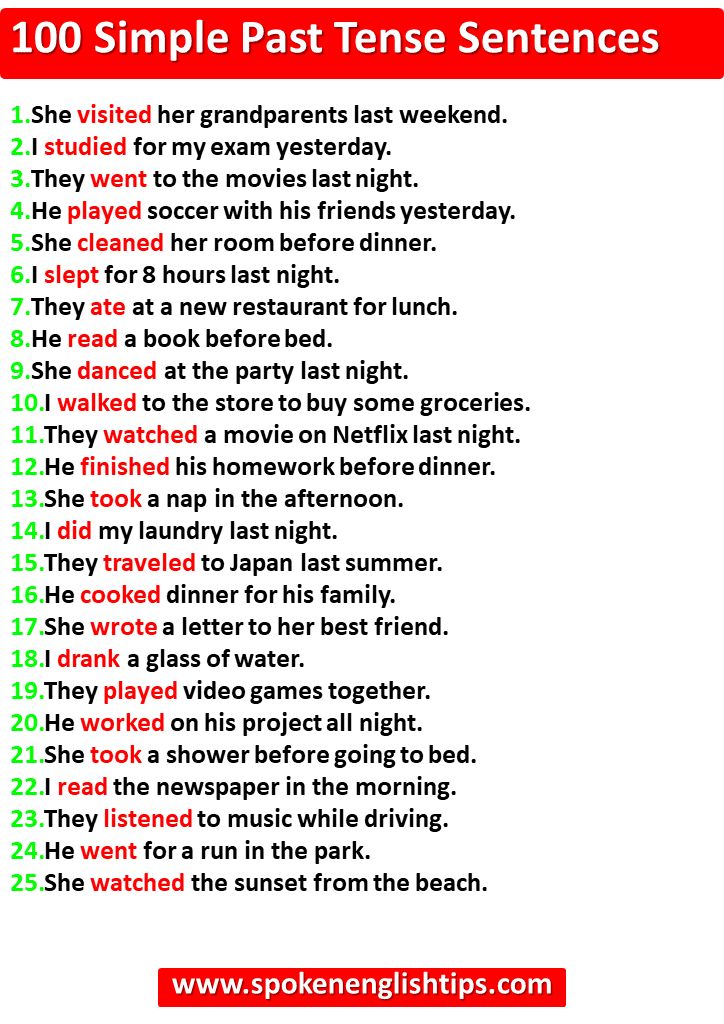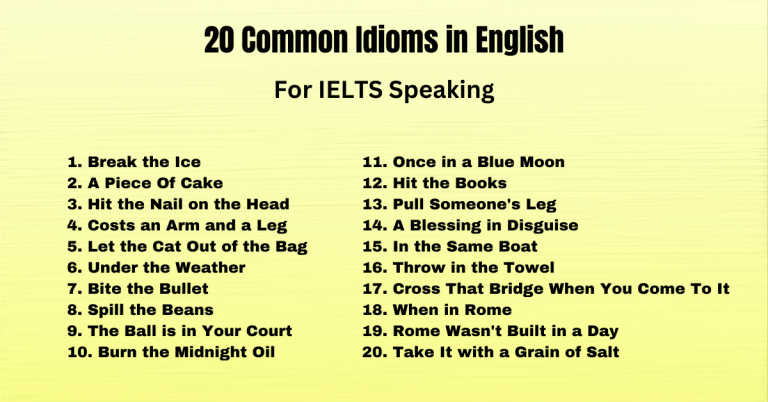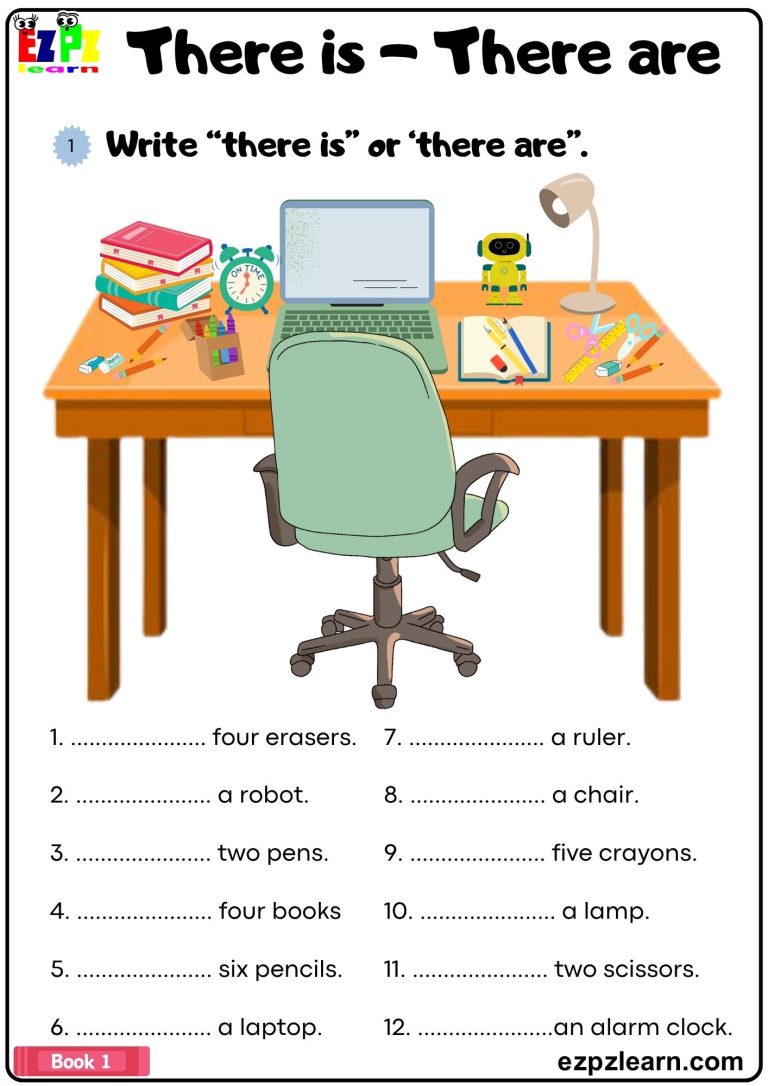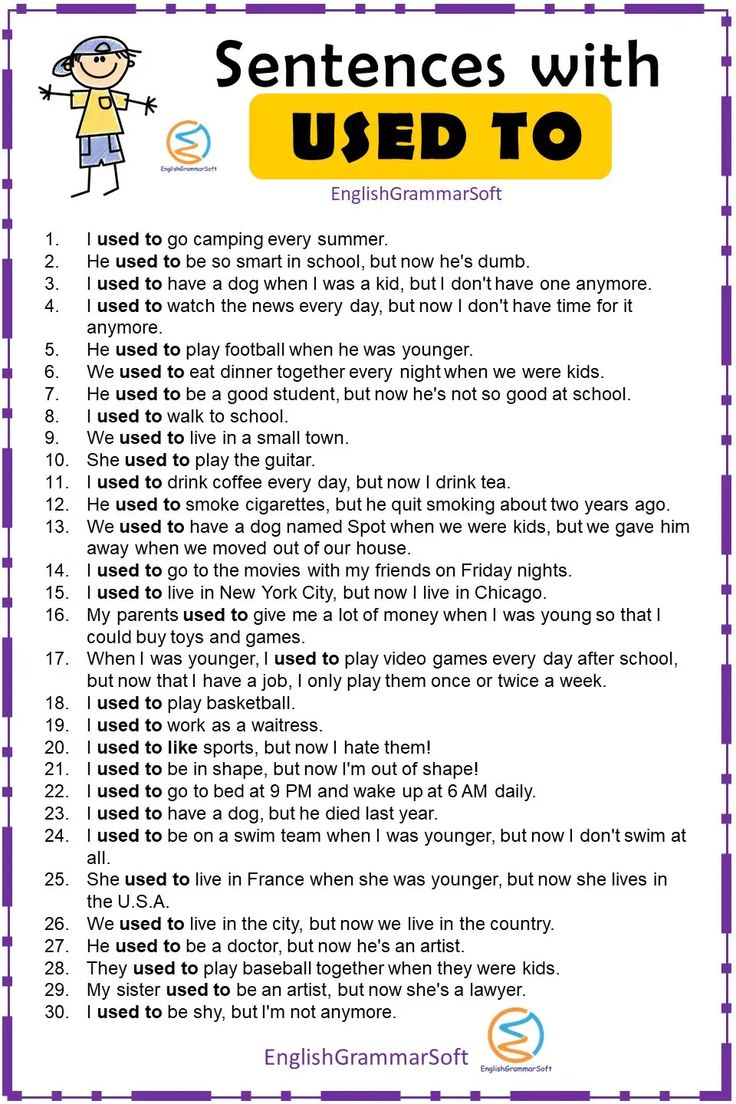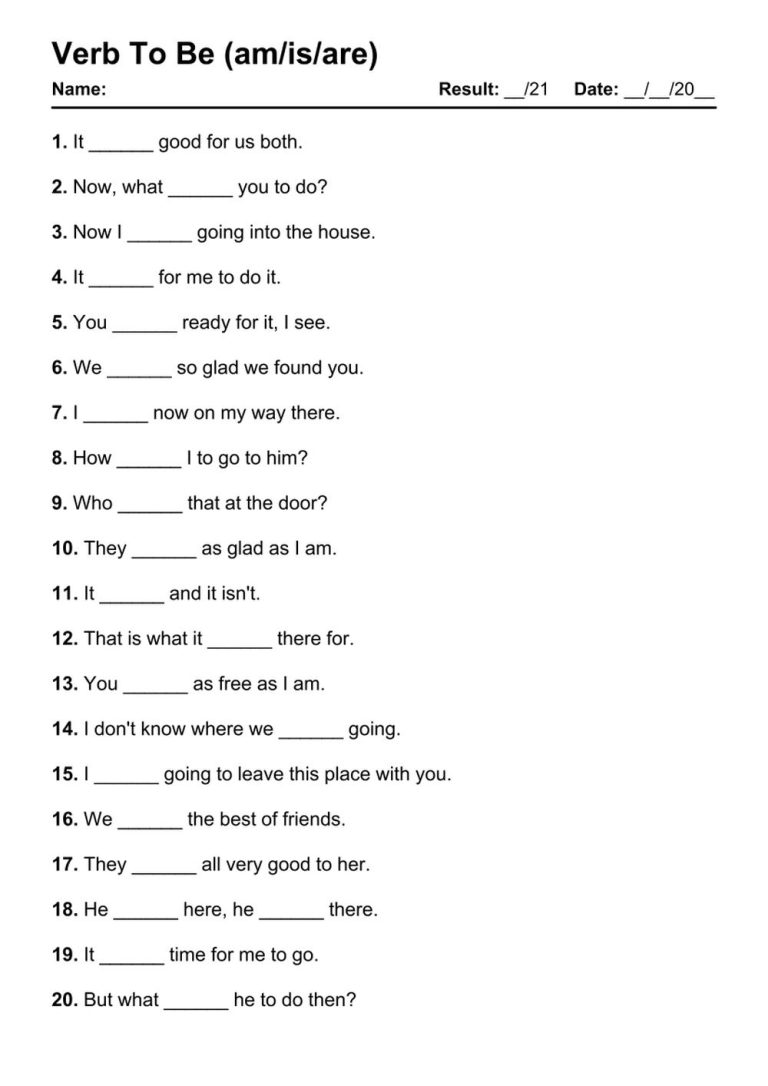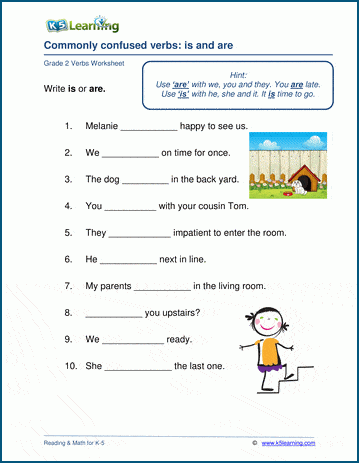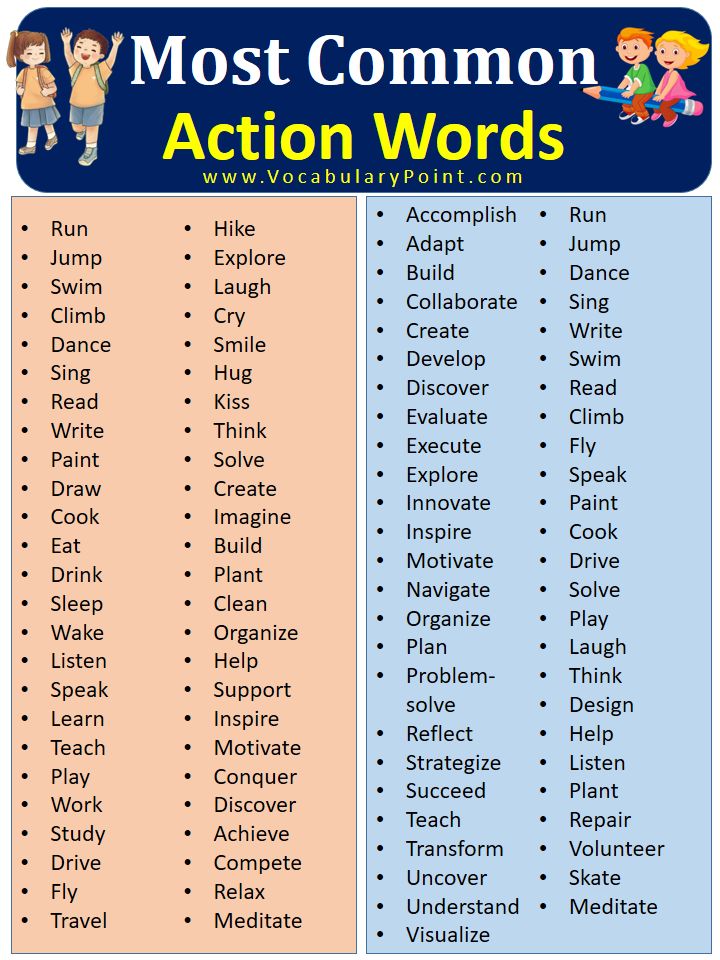100 Sentences of Simple Past Tense
Imagine a moment when you effortlessly speak about what happened yesterday, last week, or even years ago. How would it feel to confidently express past events with ease and clarity?
Mastering the simple past tense is your key to unlocking this power. This is not just about understanding grammar; it’s about transforming the way you communicate. You’ll discover how to narrate stories, share experiences, and connect more deeply with others.
You will find 100 sentences in simple past tense that will help you practice and perfect your skills. Each sentence is crafted to make learning intuitive and enjoyable, ensuring you gain confidence with every example. Dive in and see how easy it is to bring your past stories to life. Let’s get started!
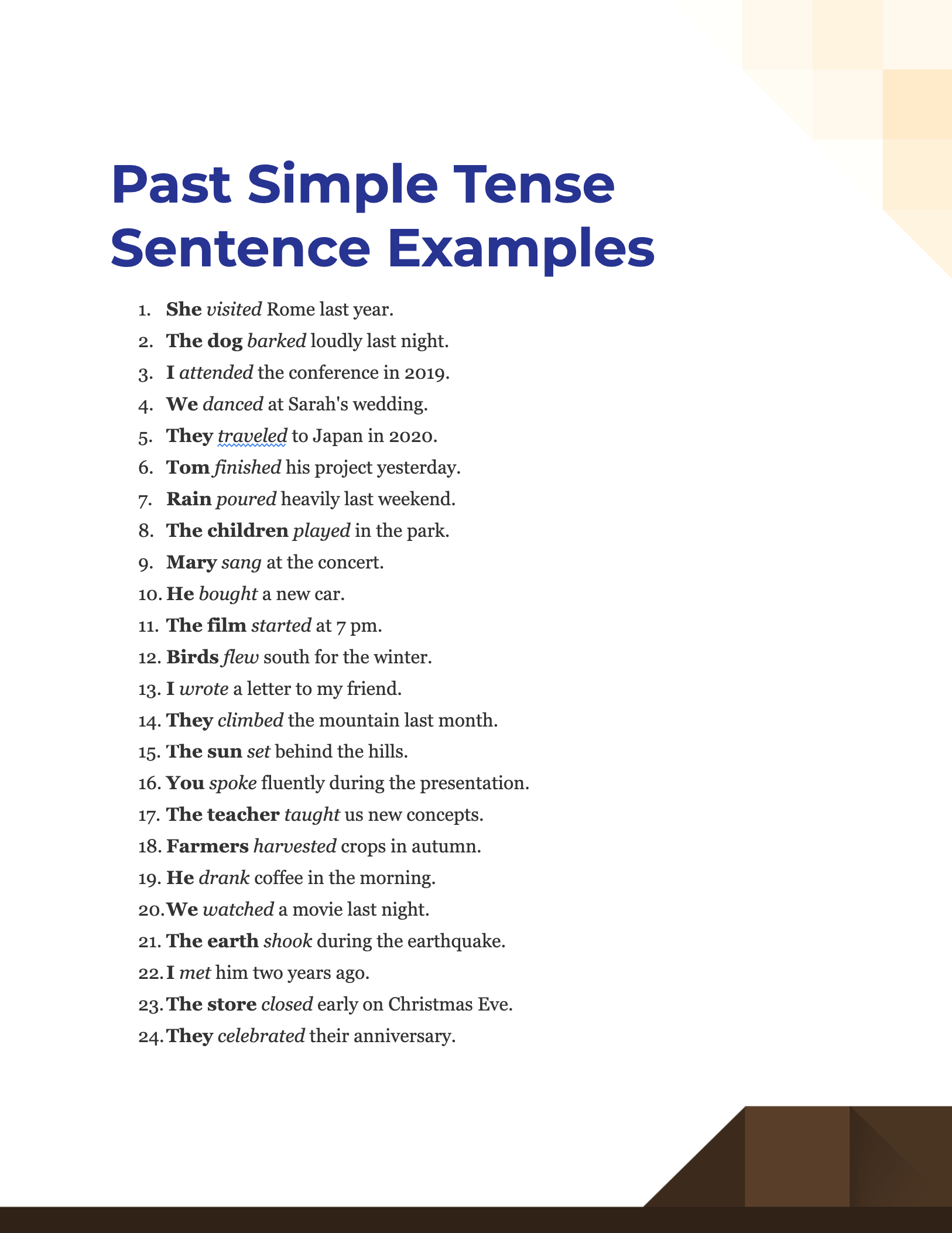
Credit: www.examples.com
Basics Of Simple Past Tense
Simple past tense talks about actions that happened in the past. It uses regular and irregular verbs. Regular verbs end with -ed. For example, “played,” “jumped,” “walked.” Irregular verbs change differently. For example, “went,” “had,” “saw.”
To make a simple past tense sentence, start with the subject. Then, add the verb in past form. “She cooked dinner.” “They visited the zoo.” Negative sentences use “did not” and the verb’s base form. “He did not play.” “We did not eat.”
Use simple past to describe finished actions. “Yesterday, I read a book.” “Last week, we went camping.” It also tells stories. “Once, there was a brave knight.” “Long ago, dinosaurs roamed the earth.”
Forming Simple Past Sentences
Simple past tense is used to talk about actions that happened before. It often ends with “-ed” for regular verbs. Irregular verbs have different forms. The sentence starts with a subject. Then comes the past verb. Examples include “I walked” or “She sang.” Questions start with “did” and then the subject. For example, “Did you play?” Negatives use “did not” or “didn’t.” For instance, “He didn’t run.” Practicing helps in understanding.
- She cookeddinner last night.
- We visitedthe zoo yesterday.
- He reada book on Sunday.
- They playedfootball in the park.
- Mary watcheda movie on TV.
Some verbs change completely. These are called irregular verbs. “Go” becomes “went.” “Eat” changes to “ate.” “Have” turns into “had.” Memorizing these forms is important. Practice with lists of irregular verbs. It helps in making correct sentences. Regular practice makes it easier.
Regular Verbs In Past Tense
Regular verbs often end with “-ed” in the past tense. This pattern is simple and easy to learn. For example, “play” becomes “played” and “work” turns into “worked”. Children played outside yesterday. Mom cooked dinner last night. Dad washed the car last weekend. They all enjoyed their day. Regular verbs make sentences clear and straightforward. Little changes make verbs past tense. He listened to music in the evening. She jumped high during the game. We watched TV after school. These verbs help us talk about actions that happened before.
Irregular Verbs In Past Tense
Irregular verbscan be tricky. They don’t follow usual rules. The verb “go” changes to “went” in the past. “Eat” becomes “ate”. These verbs need memory. Practice is key. “See” turns into “saw”. “Take” becomes “took”. Each verb has its own form. “Write” changes to “wrote”. “Speak” turns into “spoke”. Remembering them helps a lot. Learn step by step. Use them in sentences. “Drink” becomes “drank”. “Drive” changes to “drove”.
Understandingthese verbs is useful. Kids can learn them easily. Short exercises help. Repeat them often. Make learning fun. “Find” changes to “found”. “Feel” turns into “felt”. Everyone can learn these. Start with simple verbs. Practice makes perfect. “Begin” becomes “began”. “Run” turns into “ran”. Use them in stories. Share with friends. Help each other learn. Keep practicing.
Sentence Structure
Simple past tense is used to show actions that happened in the past. The basic structure is subject + verb in past form. For example, “She walkedto school.” The action is complete. Regular verbs add -edfor past tense. Irregular verbs change form, like “go” to “went”.
Negative sentences use “did not” before the base verb. Example: “He did not playsoccer.” Questions use “Did” at the start. For instance, “Did you seethe movie?” Remember, these rules help in forming correct past tense sentences.
Affirmative Sentences
He playedsoccer yesterday. She cookeddinner last night. They visitedthe zoo last week. We watcheda movie on Friday. I finishedmy homework. The dog barkedloudly. My sister cleanedher room. The cat sleptall day. He wrotea letter. She reada book.
The teacher explainedthe lesson. We boughta new car. He ranfast at the race. She painteda picture. The baby criedfor milk. The sun shonebrightly. They climbedthe hill. We listenedto music. I calledmy friend. She dancedgracefully.
The kids playedin the park. He watchedTV after dinner. She sanga beautiful song. The flowers bloomedin spring. He traveledto Paris. We wentto the beach. The bird flewhigh. She seweda dress. They laughedat the joke. The phone rangloudly.
Negative Sentences
He did not eatthe cake. She did not go to school. We did not play football. They did not read the book. The cat did not sleep. My brother did not finish his homework. The teacher did not check the papers.
My dad did not watch TV. The kids did not swim. The dog did not bark. She did not wear a hat. He did not call me. We did not visit grandma. They did not dance at the party.
The car did not stop. The bus did not arrive. My mom did not cook dinner. The bird did not fly. The sun did not shine. The rain did not fall. The shop did not open.

Credit: in.pinterest.com
Interrogative Sentences
Did you see the movie yesterday? Did you finish your homework last night? Did you visit your grandma last week?
Was the weather nice last weekend? Was the party fun? Was the exam hard for you?
Were they at the park yesterday? Were they happy about the news? Were they playing soccer after school?
Did he call you last night? Did she bake a cake? Did he find his lost pen?
Did we win the game? Did we learn new things in class? Did we have a picnic last Saturday?
Examples Of Simple Past Sentences
She wentto the park yesterday. He playedfootball last Saturday. The cat slepton the sofa. They watcheda movie last night. We visitedthe museum last weekend. I reada book last week.
Did you finishyour homework? Yes, I finishedit. Did she callyou yesterday? No, she didn’t callme. Where did they golast night? They wentto the restaurant.
He didn’t eatbreakfast this morning. She didn’t seethe movie last night. We didn’t visitthe zoo yesterday. They didn’t playgames last weekend. I didn’t writea letter last month.
The sun setearly yesterday. The train arrivedon time. The flowers lookedbeautiful in the garden. The children laughedloudly. The dog barkedat the stranger.
Common Mistakes
Simple past tense often confuses writers. Many write long sentences. This makes reading hard. Keep sentences short. Avoid unnecessary words. Stick to past actions. Use verbs correctly. “I walked to school” is clear. Do not write “I am walking to school.” Wrong tense. Some mix verb forms. Simple past needs one verb. “He ate” is correct. Not “He has eaten.” Watch verb endings. “She danced” is right. “She dances” is present. Be careful with time words. “Yesterday, I played” is simple past. “Tomorrow, I will play” is future tense.
Remember subject-verb agreement. “They were happy” matches. “He were happy” does not. Check plural forms. “They visited” is good. “They visit” is not past. Practice writing simple sentences. Helps avoid mistakes. Read examples to learn. Write often to improve. Ask for feedback. Correct errors quickly. Simple steps make writing better. Focus on clarity. Use simple language. Avoid complex words. Simple past should be easy. Keep practicing. Mistakes will decrease. Writing gets easier.
Tips For Mastering Simple Past
The simple past tense tells about actions that happened before. It helps in telling stories from the past. Using this tense is easy. You just need to know the right verb form. Words like “played” and “watched” are examples. These words show completed actions. Pay attention to irregular verbs too.
Many people forget the correct verb form. Some use present tense by mistake. This makes sentences confusing. Always check your verbs. Make sure they match the past tense form. Remember, not all verbs end with “-ed”. Some verbs change completely. Learn these verbs well.
Practice makes perfect. Write short stories using simple past. Read your sentences aloud. This helps in understanding better. Use simple sentences first. Then try more complex ones. Ask friends to check your work. They can help you find mistakes. This way, you learn quickly.
Practical Applications
Simple past tense tells what happened. It helps in telling stories. Kids can use it to describe events. Teachers use it for lessons. Parents use it in daily talks. It is useful in writing. Authors use it for books. Reporters use it for news. Everyone uses it daily. Learning it is important. It helps in understanding English better.
Examples are everywhere. “He ate breakfast.” “She walked to school.” “They played outside.” These sentences are easy. They show actions completed. Practice makes it simple. Kids can practice with friends. They can write sentences. This improves their skills. Parents can help them learn. Teachers can give exercises. Fun games can be used. This makes learning exciting.
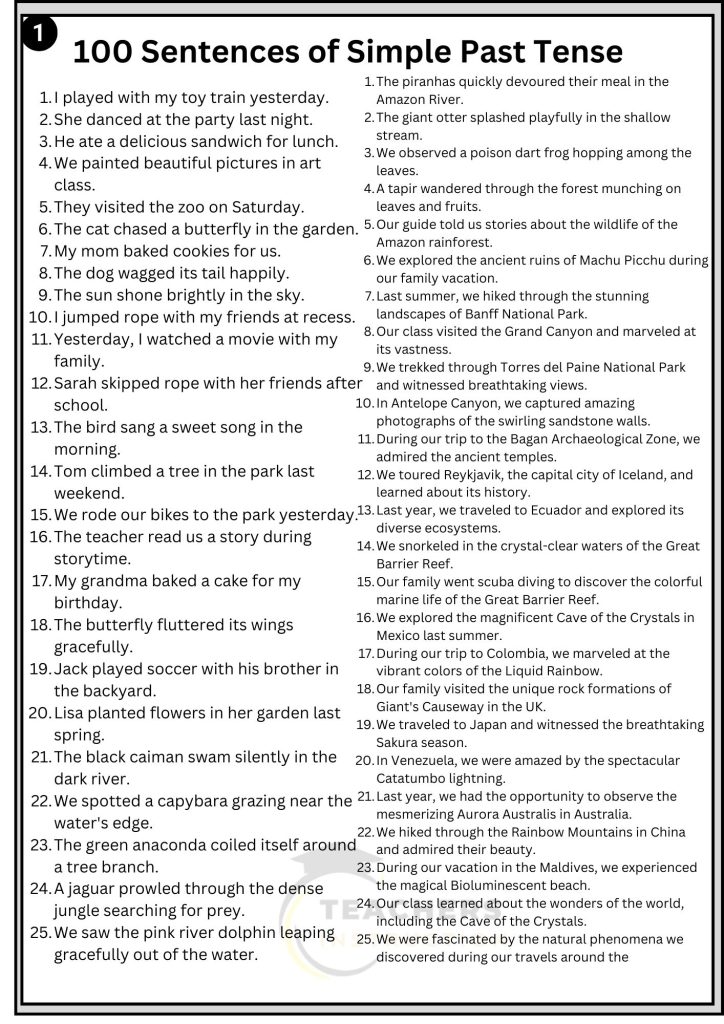
Credit: teachersinstruction.com
Frequently Asked Questions
What Is Simple Past Tense Used For?
The simple past tense is used to describe actions that happened in the past. It indicates a completed action and often includes a specific time. This tense is essential for storytelling, giving historical accounts, or sharing past experiences.
How Do You Form Simple Past Sentences?
To form simple past sentences, use the base verb with “-ed” for regular verbs. Irregular verbs have unique past forms. For example, “walk” becomes “walked,” while “go” becomes “went. ” Always use the simple past form to express completed actions.
Can You List Simple Past Tense Examples?
Sure! Examples include: “She visited Paris,” “They played soccer,” and “He cooked dinner. ” These sentences show actions completed in the past. Learning various examples can help you better understand the simple past tense.
Are All Verbs Regular In Simple Past Tense?
No, not all verbs are regular in simple past tense. Many verbs are irregular, meaning they don’t follow the standard “-ed” ending. Examples include “write” (wrote), “see” (saw), and “drink” (drank). It’s important to learn these irregular forms.
Conclusion
Exploring the simple past tense enriches your language skills. Understanding past events becomes easier. The examples shared offer a solid foundation. Practice regularly to boost confidence. Simple past tense helps convey stories effectively. It is a fundamental part of English communication.
Grasping it opens new opportunities for learning. Use these sentences as a guide. Try creating your own examples. The more you practice, the better you become. Keep practicing and soon it will feel natural. Enjoy the journey of learning English.
Every step forward counts. Happy learning!
